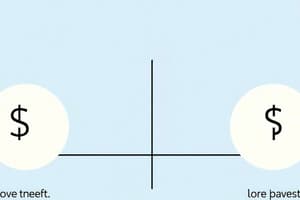Podcast
Questions and Answers
What does the term 'scarcity' refer to in the context of economics?
What does the term 'scarcity' refer to in the context of economics?
- The tendency for households to waste resources.
- The ability to produce unlimited goods and services.
- The government's control over resource distribution.
- The limited nature of society's resources restricting production. (correct)
How does the concept of resource allocation in a household compare to that in a society?
How does the concept of resource allocation in a household compare to that in a society?
- Only households have to manage scarce resources.
- Households prioritize luxury goods over basic needs.
- Both require decisions on the allocation of time and resources. (correct)
- Societies allocate resources based on individual preferences only.
What is a key similarity between households and economies?
What is a key similarity between households and economies?
- Both have an abundance of resources.
- Both systems operate without any limitations.
- Both require management and allocation of resources. (correct)
- Both are driven solely by individual desires.
In the allocation process within a society, what factor is crucial for determining who gets what?
In the allocation process within a society, what factor is crucial for determining who gets what?
Which statement best describes the impact of scarcity on individual aspirations within society?
Which statement best describes the impact of scarcity on individual aspirations within society?
What outcome may result from the implementation of pollution regulations?
What outcome may result from the implementation of pollution regulations?
Efficiency in an economic context is best described as:
Efficiency in an economic context is best described as:
Which of the following best exemplifies a government policy that seeks to promote equality?
Which of the following best exemplifies a government policy that seeks to promote equality?
What is a potential negative consequence of government efforts to redistribute income?
What is a potential negative consequence of government efforts to redistribute income?
What trade-off does society face when designing government policies?
What trade-off does society face when designing government policies?
What is the primary effect of seat belt laws on driving behavior?
What is the primary effect of seat belt laws on driving behavior?
How do seat belts impact the marginal cost of driving safely?
How do seat belts impact the marginal cost of driving safely?
Which scenario demonstrates how road conditions affect driving behavior?
Which scenario demonstrates how road conditions affect driving behavior?
What is a likely unintended consequence of enacting seat belt laws?
What is a likely unintended consequence of enacting seat belt laws?
What principle explains the change in driving behavior following the introduction of seat belt laws?
What principle explains the change in driving behavior following the introduction of seat belt laws?
What does Peltzman's study suggest about the effects of auto-safety laws on driver and pedestrian safety?
What does Peltzman's study suggest about the effects of auto-safety laws on driver and pedestrian safety?
Which principle addresses how individuals' decisions affect not only themselves but also others?
Which principle addresses how individuals' decisions affect not only themselves but also others?
What do auto-safety laws primarily influence according to the discussion of incentives?
What do auto-safety laws primarily influence according to the discussion of incentives?
In what way does Peltzman's conclusion about auto-safety laws reflect a broader economic concept?
In what way does Peltzman's conclusion about auto-safety laws reflect a broader economic concept?
How might changes in auto-safety laws indirectly influence pedestrian safety?
How might changes in auto-safety laws indirectly influence pedestrian safety?
Flashcards
Scarcity
Scarcity
The situation where there are limited resources to satisfy unlimited wants.
Economics
Economics
The study of how society manages its scarce resources.
Resource Allocation
Resource Allocation
The process of allocating resources among members of a society to produce and distribute goods and services.
Limited Resources
Limited Resources
Signup and view all the flashcards
The Economic Problem
The Economic Problem
Signup and view all the flashcards
Trade-off
Trade-off
Signup and view all the flashcards
Efficiency in Economics
Efficiency in Economics
Signup and view all the flashcards
Equality in Economics
Equality in Economics
Signup and view all the flashcards
Redistribution Policies
Redistribution Policies
Signup and view all the flashcards
Trade-off between Efficiency and Equality
Trade-off between Efficiency and Equality
Signup and view all the flashcards
Unintended Consequences
Unintended Consequences
Signup and view all the flashcards
Cost-Benefit Analysis
Cost-Benefit Analysis
Signup and view all the flashcards
Risk Compensation
Risk Compensation
Signup and view all the flashcards
Marginal Benefit
Marginal Benefit
Signup and view all the flashcards
Marginal Cost
Marginal Cost
Signup and view all the flashcards
Incentive Response
Incentive Response
Signup and view all the flashcards
Opportunity Cost
Opportunity Cost
Signup and view all the flashcards
Indirect Effect
Indirect Effect
Signup and view all the flashcards
Trade Benefits
Trade Benefits
Signup and view all the flashcards
Trade Efficiency vs. Equality
Trade Efficiency vs. Equality
Signup and view all the flashcards
Study Notes
Ten Principles of Economics
- Economics originates from the Greek word "oikonomos," meaning "one who manages a household."
- Households and economies share common characteristics, such as allocating scarce resources among members.
- Scarcity is the limited nature of society's resources, preventing the production of all desired goods and services.
- Economics studies how societies manage scarce resources.
- Economic decisions are often trade-offs: one choice comes at the cost of another.
- The cost of something is what you give up to get it; this includes opportunity costs.
- Rational people think at the margin, making decisions based on the additional costs and benefits of small adjustments.
- People respond to incentives; altering costs or benefits changes behavior.
How People Interact
- Trade can be mutually beneficial, enabling specialization and greater variety of goods and services.
- Markets are generally a good way to organize economic activity, guiding individuals and firms towards shared gains through price signals.
- Governments sometimes improve market outcomes by enforcing property rights and addressing market failures, such as externalities or monopolies.
How the Economy as a Whole Works
- A country's standard of living depends on its productivity—the quantity of goods and services produced from each unit of labor input.
- Prices rise when the quantity of money increases, leading to inflation.
- Society faces a short-run trade-off between inflation and unemployment.
Studying That Suits You
Use AI to generate personalized quizzes and flashcards to suit your learning preferences.




